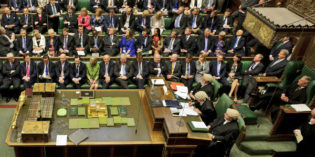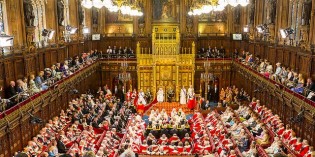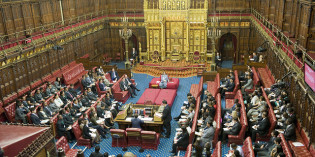Tag: Meg Russell

Book review | Legislation at Westminster: Parliamentary Actors and Influence in the Making of British Law
In Legislation at Westminster: Parliamentary Actors and Influence in the Making of British Law, Meg Russell and Daniel Gover offer a comprehensive and empirically rigorous assessment of the role that parliament plays in the UK policy-making process. This is a meticulously researched book, writes Ed Page, that is a must-read for both students and scholars wanting to better understand how laws […]

The six faces of parliamentary power
The Westminster parliament is famous throughout the world, but often presented as relatively non-influential when it comes to making the law. Meg Russell and Daniel Gover‘s new book Legislation at Westminster is the most detailed study of the British legislative process for over 40 years, and challenges these assumptions. The authors summarise their findings on […]

What to read in the age of Trump
We need to think about democracy – now more than ever. As Donald Trump becomes the 45th President of the United States, Democratic Audit asked Brian Klaas, Russell Dalton, Cas Mudde and Meg Russell what texts they are turning to in order to understand and learn from the Trump phenomenon. This post is a work in progress […]

800 peers and counting: how can we cut the size of the House of Lords?
The Lords has faced increasing criticisms over its size – now well over 800 members – and David Cameron was criticised for his excessive peerage appointments. We now not only have a new Prime Minister, but a new Lord Speaker who has spoken out clearly about the need to reduce the size of the chamber […]

Corbyn’s election was an organisational phenomenon that raises profound questions about political party ownership
Changes to the way the Labour leader is elected were an essential factor in Jeremy Corbyn’s victory. Meg Russell explains how the switch to a ‘one member one vote’ system was a fundamental change for the party – and for British politics – with last summer’s events raising profound questions about party democracy. This text is adapted […]

For the first time a Conservative government is experiencing repeated defeats in the Lords
In the aftermath of the Lords defeats on tax credit cuts there has been much talk of a ‘constitutional crisis’. In this post Meg Russell argues that whilst last Monday’s vote was certainly unusual, the most significant change is the wider political context: that it is a Conservative government on the receiving end of repeated defeats in the Lords. Much like […]

Is David Cameron actually seeking to destroy the Lords?
Yesterday’s new peerage appointments attracted almost universal criticism for further adding to the inexorable growth in size of the House of Lords under David Cameron. But could the gradual erosion of the Lords’ reputation actually benefit the government by weakening parliament? Might it even be a deliberate plan? And – given that the Prime Minister […]

The new government’s constitutional reform agenda – and its challenges
Following the surprise election of a Conservative government with a small majority, Meg Russell and Robert Hazell offer an overview of the constitutional reforms which are likely to be prioritised and the associated difficulties that may arise. Similar PostsHow democratic is the House of Commons? How effectively does it control the UK government and represent citizens?How […]

The Speaker election row tells us two important things about parliament
On 26 March, its final sitting day, the House of Commons rejected government proposals to reform how the Speaker is elected at the start of the new parliament. Here Meg Russell reflects on what this teaches us about parliament, suggesting it holds two lessons. First, that the 2010 House of Commons was more resistant than […]

Enough is enough: Time to regulate prime ministerial appointments to the Lords
This week the Constitution Unit publishes a new report arguing that the time has come to regulate prime ministerial appointments to the House of Lords – to prevent the chamber’s size escalating further, and prevent government manipulating its membership. The report argues that, despite large-scale Lords reform being awaited, this step is urgent ahead of […]


 Democratic Audit's core funding is provided by the Joseph Rowntree Charitable Trust. Additional funding is provided by the London School of Economics.
Democratic Audit's core funding is provided by the Joseph Rowntree Charitable Trust. Additional funding is provided by the London School of Economics.